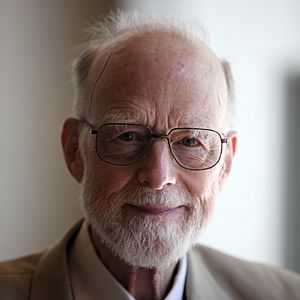Tony Hoare facts for kids
Quick facts for kids
Sir Tony Hoare
FRS FREng
|
|
|---|---|

Tony Hoare in 2011
|
|
| Born |
Charles Antony Richard Hoare
11 January 1934 |
| Education | |
| Known for |
|
| Spouse(s) | Jill Pym |
| Children | 3 |
| Awards |
Turing Award (1980)
Harry H. Goode Memorial Award (1981) Faraday Medal (1985) Computer Pioneer Award (1990) Kyoto Prize (2000) IEEE John von Neumann Medal (2011) Royal Medal (2023) |
| Scientific career | |
| Fields | Computer science |
| Institutions |
|
| Doctoral students |
|
Sir Charles Antony Richard Hoare (born 11 January 1934), often called Tony Hoare, is a famous British computer scientist. He has made many important discoveries in how computers work and how we write computer programs. His work has helped shape the world of computers as we know it today.
He is especially known for creating a super-fast way to sort information called quicksort. He also developed Hoare logic, which helps prove that computer programs work correctly. In 1980, he won the Turing Award, which is like the Nobel Prize for computer science.
Contents
Early Life and Education
Tony Hoare was born in Colombo, which was then called Ceylon (now Sri Lanka). His parents were British. He went to school in England at the Dragon School and the King's School.
He first studied Classics and Philosophy at Merton College, Oxford. After graduating in 1956, he joined the Royal Navy for 18 months. There, he learned to speak Russian.
In 1958, he returned to the University of Oxford to study statistics. This is where he first started learning about computer programming. He then went to Moscow State University as an exchange student. He studied how computers could translate languages.
Discoveries and Career
In 1960, Tony Hoare started working at Elliott Brothers Ltd, a company that made computers in London. Here, he helped create a computer language called ALGOL 60. He also started to develop some very important algorithms. An algorithm is like a step-by-step recipe for a computer to follow.
The Quicksort Algorithm
One of his most famous inventions is the quicksort algorithm. He developed this in 1959–1960. Imagine you have a huge pile of mixed-up papers and you need to sort them very quickly. Quicksort is a clever way to do this on a computer. It's one of the fastest ways to sort information, and it's used in many computer programs today.
Hoare Logic
Tony Hoare also created something called Hoare logic. This is a special system that helps computer scientists prove that a computer program will always do exactly what it's supposed to do. It's like a mathematical way to check if a program is correct and won't have unexpected errors.
Communicating Sequential Processes (CSP)
He also came up with a formal language called communicating sequential processes (CSP). This language helps describe how different parts of a computer program can work together at the same time. It's important for understanding how complex computer systems, like operating systems, manage many tasks at once.
A "Billion-Dollar Mistake"
In 1965, Tony Hoare made a decision he later called his "billion-dollar mistake." He added something called a "null reference" to a programming language. A null reference is like a pointer that doesn't point to anything.
He said it was easy to add, but it has caused many computer errors and crashes over the years. He joked that it probably caused a billion dollars of problems! This shows that even brilliant scientists can learn from their past decisions.
Teaching and Research
In 1968, he became a professor at the Queen's University of Belfast. Later, in 1977, he returned to University of Oxford as a professor. He led the Programming Research Group there. He retired from Oxford in 2000.
Even after retiring, he continued his work. He became a principal researcher at Microsoft Research in Cambridge, England.
Awards and Honors
Tony Hoare has received many awards for his amazing contributions to computer science.
- In 1980, he won the Turing Award. This is one of the highest honors a computer scientist can receive.
- He became a Fellow of the Royal Society in 1982. This is a very old and respected group of scientists.
- He was made a Knight by the Queen in 2000 for his work in education and computer science. This means he is called "Sir Tony Hoare."
- In 2000, he also received the Kyoto Prize, another very important international award.
- In 2006, the Computer History Museum honored him for developing the Quicksort algorithm.
- He received the Royal Medal from the Royal Society in 2023.
Personal Life
In 1962, Tony Hoare married Jill Pym. She was also part of his research team.
Books
Tony Hoare has also written books about computer science. One of his well-known books is Communicating Sequential Processes, published in 1985.
See also
 In Spanish: C. A. R. Hoare para niños
In Spanish: C. A. R. Hoare para niños
 | Calvin Brent |
 | Walter T. Bailey |
 | Martha Cassell Thompson |
 | Alberta Jeannette Cassell |

